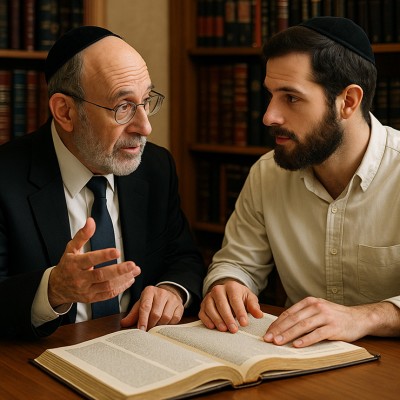
Many commentaries ask: Why does the Torah use the seemingly extra word ish—“man”—when describing Noach as ish tzaddik? Wouldn’t “Noach was a tzaddik” have sufficed?
Chazal teach that this wording reveals a fundamental lesson: Before one can strive to be a tzaddik, before diving into the depths of learning or sharpening intellectual prowess, one must first be an ish—a mensch. This means being pleasant, kind, humble, patient, and approachable. Being a good person comes first.
The Shidduch Interview That Changed the Question
Rav Shmuel Rozovsky, zt”l, Rosh Yeshivah of Ponevezh, once received a visit from a man seeking information about a potential shidduch for his daughter. The father asked thorough questions: How many hours a day does the bochur learn? Is he punctual? Does he attend all the sederim and t’filot? Does he ask intelligent questions in shiur and understand the answers?
After answering patiently, Rav Shmuel gently responded, “May I ask you something in return?”
“You’ve asked detailed questions about your future son-in-law’s learning. But shouldn’t your daughter also want to know: Is he a ben adam—a mensch? Does he brush his teeth? Is it pleasant to sit near him at the table? In the dining room, does he rush to grab the best portion, or does he linger in the beis medrash after Minchah and take whatever food remains?”
“Does he offer to refill the pitcher when it’s empty, or just wait for someone else to do it? Does he thank the kitchen staff for their effort? If the food isn’t to his liking, does he still eat and express gratitude, or run to the kiosk and buy snacks?”
Rav Shmuel concluded, “If he can’t appreciate the effort of others, how will he react when he comes home from kollel, and your daughter—who’s been preparing a home-cooked meal since the morning—serves him something not quite to his liking? Will she feel comforted that he’s a masmid, or will she be crushed by his disappointment?”
Rav Chaim’s View of Soup and Torah
Rav Chaim Shmuelevitz, zt”l, once hosted an old chaver from his youth who had come from America to visit the Mir Yeshivah. After Minchah, Rav Chaim brought him home and told his wife, “Chana Miriam, baruch Hashem, we have a guest for lunch.”
The rebbetzin served soup. Rav Chaim, eating quickly as usual, finished and asked for a second helping, then a third. The guest, surprised, asked, “Is this really proper behavior for a Torah giant—to keep asking for more food?”
Rav Chaim smiled. “Let me explain. When I deliver a shiur kelali and someone asks me to repeat it, it brings me great joy. And even more so when another person asks again. Now consider my wife—this soup is her shiur. She went to buy vegetables, peeled them, dealt with no gas in the house, arranged delivery—and cooked the soup. That’s her shiur! When I say noch eins, I’m telling her: ‘You prepared something beautiful, please teach it again.’ It brings her immense nachat ruach.”
That’s what made him Rav Chaim—he understood that to be great, one must first be a mensch.
“A mentsh vert men nit in eyn tug—A person doesn't become a mentsh in one day.”
“אז מען דאַרף זיין אַ מענטש...” – One must be a mensch!
(Sefer Havi Shakud Lilmod Torah, p. 22–23)
Rabbi Leeor Dahan, a graduate of Yeshiva Chofetz Chaim/RSA, is a noted scholar and teacher, well-versed in halachah. He currently leads Kehilat Avodat Hashem in Hillcrest, Queens, inspiring his congregation to delve into Torah study and embrace its eternal teachings.
Noach: Becoming A Mensch Before A Tzaddik
Typography
- Smaller Small Medium Big Bigger
- Default Helvetica Segoe Georgia Times
- Reading Mode




